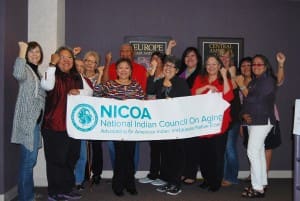 NICOA recently worked with the native group nDigiDreams to gather elders to tell their stories about their lives and how their experiences were impacted by federal programs such as the Older Americans Act, Social Security, healthcare and the Senior Community Service Employment Program (SCSEP).
NICOA recently worked with the native group nDigiDreams to gather elders to tell their stories about their lives and how their experiences were impacted by federal programs such as the Older Americans Act, Social Security, healthcare and the Senior Community Service Employment Program (SCSEP).
Digital storytelling offers unique differences from other approaches which is why we thought it would be a good fit for our Native elders. The video production team, Brenda Manuelito and Carmella Rodriguez are Native women who have created over 1500 digital stories across the country. Their success is due to a unique combination of skills. Over the course of four days they create a comfortable, creative space for people to share their lives and build a sense of community. They also have talent in the technologies required to layout, edit and blend film, narration and music together in an effective way.
The process begins with locating elders to participate. Elders have many stories to tell and if they want to take part, usually transportation is a concern. Some elders got support from their Pueblo which allowed them to avoid a long commute every morning. Flexibility is needed to accommodate doctor appointments or other medical needs. This process was new for NICOA and this group of elders were very pioneering, flexible with their time, and willing to learn.
Everyone gathered in our meeting room which was filled with laptops, wires and a projector. DEC and local sponsors provided coffee and food each day and after introductions Brenda and Carmella showed the group several digital stories (ndigistories). Each day they shared more digital stories so everyone could see the power of the stories. Digital storytelling is different from having a person sit in a chair with the camera pointed towards them. Instead they illustrate their personal story with a voice recording, photos and other media to create the world they know.
The group moved to a quiet room and sat together as Brenda Manuelito led the discussion and encouraged people to talk about their lives. She empathized that in a talking circle the words are sacred, similar to a prayer, and only the people present in the circle can know what is shared.
This beginning really set the tone for the rest of the workshop with people listening, laughing, crying, and sharing the significant moments of each other’s lives. Everyone has a story and the process of talking together helped people to realize they have something unique and important to share.
Next, everyone developed a script with assistance from nDigiDreams Producers and NICOA staff. Keywords in the script pointed towards photos and other images to tell the story. Gathering photos and scanning onto thumb drives filled many hours. Considering the size of the task, pulling together these stories in four days is remarkable.
Watching all the pieces come together was very exciting and as we came close to finishing, no one wanted to leave, despite the late hour. When the work was done, everyone waited expectantly as the red carpet was rolled out and each storyteller received a bracelet welcoming them into the nDigifamily of storytellers. As each elder introduced their story it became clear that they had successfully translated the story they told at the beginning into a digital story. The stories were varied and rich, moving and funny. The stories were personal but also helped to illustrate the need for federal social programs such as the Older Americans Act, Social Security, healthcare and SCSEP.
By the end of the workshop all elders were quite enthusiastic and could see the potential of the approach for lots of purposes. The digital story they co-created will be a legacy piece they can show their children and grandchildren about their life’s journey.
nDigiDreams also worked with Randella Bluehouse, NICOA Executive Director, to create a digital story about NICOA. This story provides an overview and context for all the work accomplished by NICOA since it was founded in 1976. Executive Director Bluehouse also points towards the ongoing work still needed to improve the lives of elders across the country. She comments, “The story of NICOA and the stories of our elders help to educate others about the importance of aging services in all communities, especially those across Indian Country”.
Stories can help leaders, funders and other interested stakeholders to understand the importance of the work you do. Check out the nDigiDreams approach and see if something similar might be of interest for your organization. Other sources of information include the Center for Digital Storytelling and for more on the value of storytelling, check out the Goodman Center.
NICOA’s Native Elder Digital Storytelling Project videos will be available on the NICOA website in February, 2016. Visit our website at www.nicoa.org to view the video series.
All of us offer our thanks to the elders who participated for being an inspiration to us and for their contribution to the life of our people.
Hyperlinks:
Leave a Reply